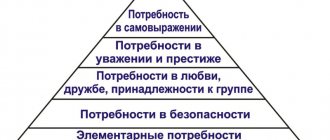What is self-actualization
What is self-actualization, what is its definition in psychology? Self-actualization is the process of personality formation, its psychological development. Every person has an inherent desire for the maximum realization of his abilities, inclinations, and capabilities. Self-actualization is based on a person's internal motives. The concept of “self-actualization” does not include passivity. A self-actualizing person himself strives to master new types of activities; he always has many plans and goals. He doesn't wait for the world to offer him something, he looks for opportunities himself.
The concept of self-actualization is closely related to the concept of self-realization. The first is the search for an answer to the question “Who am I, what should I be?” The second is the search for an answer to the question “What am I doing in order to be who I should be?” In science, the theory of self-actualization and self-realization of a person is closely related to humanistic psychology. In it, the concept of self-actualization is key. The term was introduced by K. Goldstein, who is also the author of the theory. However, besides him, the problem was studied by K. Rogers and A. Maslow. And their vision of the issue is discussed more often in psychology.
The authors’ concepts are somewhat different, for example, Maslow believed that one needs to develop actively, and Rogers preferred slow self-actualization (we’ll talk more about the types below). However, they agreed on the essence and specifics of self-actualization and believed that any person can achieve success in life if he begins to choose and direct his life. Self-actualization is the pinnacle in the theory of personality development.
The difficulty is that self-actualization largely depends on the developmental environment. What type of environment contains the potential for assumptions of favorable development of self-actualization? A friendly, developing environment, where there are warm and trusting relationships, where a person is supported and guided, and assistance is provided. It is extremely important that from an early age a person finds himself in such an environment, then the process of self-actualization will be simpler and more favorable.
Important! A self-actualizing person feels like a harmonious and whole person. He realizes his value and importance and feels that he is benefiting society.
Types of self-actualization
Self-actualization is not only complex, but also a very individual process. We can say: as many people as there are, so many options, because this is the revelation of personal potential. However, there are also common points in the process of self-actualization, and they allow us to distinguish several of its types.
Superficial and deep
The superficial one is more common and involves the actualization of a variety of personality qualities without their critical analysis and evaluation. This is free self-expression, in which not always the best and socially acceptable “talents” of an individual can be realized. After all, every person is a complex alloy of good and bad, positive and negative properties. Here, superficial self-actualization does not concern the understanding of their social significance. In simple words: what has developed has developed.
Deep, on the contrary, is the result of introspection and assessment of one’s potential not only in terms of level, but also in terms of social significance. Deep self-actualization is always growth, progressive, progressive development with the identification and disclosure of all the best in a person, those qualities that ensure the efficiency and productivity of his development and interaction with society.
Harmonious and problematic
It is good if the process of socialization is not only actively carried out by the individual himself, but also supported by society. And it’s absolutely wonderful if a person, even in his early youth, decided on the sphere of realization of his talents and abilities. He clearly knows what he wants and goes straight towards his goal, rejoicing in every success, and perceiving failures as a useful experience.
But unfortunately, such harmonious self-actualization does not happen to everyone. Often a person rushes about in search of himself, a way to realize his personal potential. And he fails because he cannot find the right path and is disappointed in his capabilities and in his benefit to society. All this can become a source of serious mental problems, and such a restless personality is sometimes at odds with society. The creativity of this person is often not accepted by society, and the hope for success is not justified.
Perhaps the individual has chosen the wrong path, the wrong field of activity, or his psyche is not able to cope with the load he has given. You cannot go to success by jumping three steps - this is the easiest way to stumble and fall.
Active and careful
These two types have been described by various leaders of humanistic psychology. Active was described and supported by A. Maslow, and K. Roger believed that the most acceptable is cautious.
What is their difference? In active or energetic self-actualization, a person moves forward, rapidly overcoming difficulties. He wants to achieve his potential and success as quickly as possible. Russians say about such people that everything is going wrong in their hands or that their soles are on fire. And indeed, this person is capable of not only burning, but also igniting others with his energy and enthusiasm.
But K. Roger believed that gradual, thoughtful work on oneself, the accumulation of internal potential and resources for a leap forward are much more useful for the individual. Such a person may move more slowly, but he makes fewer mistakes, and as a result, on the path to success he often outstrips those who are too ardent and energetic.
Probably, if the goal was to create a classification of types of self-actualization, then many more could be identified. But no one has set this goal in psychology yet.
Maslow's self-actualization theory
Why don't all people reach the level of self-actualization? It's all about the pyramid of needs that Maslow defined. The transition to a new level is impossible without satisfying the needs of the previous level. Let's briefly consider Maslow's theory of self-actualization.
Levels of the pyramid of needs:
| Level (lowest to highest) | Characteristic |
| Physiological | At this level the need for food and water, sex, sleep, good health, etc. is located. This group includes everything without which a person will die, everything that helps him to exist as an organism. This is the animal level. |
| Security needs | This group of needs includes the desire to have comfortable and permanent housing, stable work, and confidence in the future. This level also includes psychological comfort, absence of stress and threats to physical or mental health, life in a stable society, etc. This is the level of the animal, smoothly transitioning into the social. |
| Social | The need for respect, acceptance, family, friends, communication, social interaction. In a broad sense, it can be defined as a need in society. This is the social level. |
| Self-esteem | The need for self-esteem, self-acceptance. At this level, it becomes more important for a person what he thinks about himself, and not what society thinks about him. He wants to be proud of himself, strives for comfort and inner harmony, self-love and total self-acceptance. |
| Self-actualization | The need for creative self-expression and social activity. At this level, a person tries to combine the two previous stages, that is, he seeks a balance between personal and social, he learns to be himself in the conditions of society. Harmony with himself is still important to him, but at the same time he is looking for ways of self-expression that will be accepted and appreciated by society and are useful to him. |
Humanistic theory of personality by A. Maslow
Humanistic psychology, as a special direction of modern psychological science, arose in the early 60s in the USA. Its founders and recognized leaders were Abraham Maslow, Rollo May, Carl Rogers, Gordon Allport and others. Originating as an opposition to psychoanalysis and behaviorism, humanistic psychology very quickly gained recognition from a large number of professionals and became a truly real “third force” in modern psychology.
Abraham Maslow
(1908-1970) graduated from the University of Wisconsin, receiving a Doctor of Science degree in psychology in 1934. His own theory, which the scientist developed by the 50s of the 20th century, appeared on the basis of a detailed acquaintance with the basic psychological concepts that existed at that time (as well as the very idea of the need to form a third way, a third psychological direction, alternative to psychoanalysis and behaviorism).
In 1951, Maslow was invited to Branden University, where he served as chairman of the psychological department almost until his death. During the last years of his life, he also served as president of the American Psychological Association.
Speaking about the need to form a new approach to understanding the psyche, Maslow emphasized that he does not reject old approaches and old schools, is not an anti-behaviorist or anti-psychoanalyst, but is an anti-doctrinaire, i.e. opposes the absolutization of their experience.
One of the biggest shortcomings of psychoanalysis, from its point of view, is not so much the desire to downplay the role of consciousness, but the tendency to consider mental development from the point of view of the organism’s adaptation to the environment, the desire for balance with the environment. Like Allport, he believed that such equilibrium is death for the individual. Balance and rootedness in the environment negatively affect the desire for self-actualization, which makes a person an individual.
Maslow was no less active in opposing the reduction of all mental life to behavior, which was characteristic of behaviorism. The most valuable thing in the psyche - its self, its desire for self-development - cannot be described and understood from the standpoint of behavioral psychology, and therefore the psychology of behavior should not be excluded, but supplemented by the psychology of consciousness, a psychology that would explore the “I concept” of the individual.
Maslow almost did not conduct global, large-scale experiments that are characteristic of American psychology, especially behaviorism. His small, pilot studies did not so much groping for new paths as confirming what he had arrived at in his theoretical reasoning. This is exactly how he approached the study of “self-actualization” - one of the central concepts of his concept of humanistic psychology.
Unlike psychoanalysts, who were primarily interested in deviant behavior, Maslow believed that the study of human nature must be "by studying its best representatives, and not by cataloging the difficulties and errors of average or neurotic individuals." Only in this way can we understand the limits of human capabilities, the true nature of man, which is not fully and clearly represented in other, less gifted people.
The group he chose for the study consisted of eighteen people, nine of them were his contemporaries, and nine were historical figures (A. Lincoln, A. Einstein, W. James, B. Spinoza, etc.). These studies led him to the idea that there is a certain hierarchy of human needs, which looks like this:
- physiological needs - food, water, sleep, etc.;
- need for security - stability, order;
- need for love and belonging – family, friendship;
- need for respect - self-esteem, recognition;
- the need for self-actualization - development of abilities.
One of the controversial parts of Maslow's theory was that he argued: these needs are in a once and for all given rigid hierarchy and higher needs (for self-esteem or self-actualization) arise only after more elementary ones are satisfied. Not only critics, but also Maslow’s followers showed that very often the need for self-actualization or self-esteem was dominant and determined a person’s behavior despite the fact that his physiological needs were not satisfied, and sometimes prevented the satisfaction of these needs. Subsequently, Maslow himself abandoned such a rigid hierarchy, combining all needs into two classes: the needs of need (deficit) and the needs of development (self-actualization).
At the same time, most representatives of humanistic psychology accepted the term "self-actualization" introduced by Maslow, as well as his description of the "self-actualizing personality." Self-actualization is associated with the ability to understand oneself, one’s inner nature and learn to “attune” in accordance with this nature and build one’s behavior based on it. This is not a one-time act, but a process that has no end, it is a way of “living, working and relating to the world, and not a single achievement.” Maslow identified the most significant moments in this process that change a person’s attitude towards himself and the world and stimulate personal growth. This can be an immediate experience—a “peak experience”—or a long-term experience—a “plateau experience.”
Describing a self-actualizing personality, Maslow said that such a person is characterized by acceptance of himself and the world, including other people. These are, as a rule, people who adequately and effectively perceive the situation, centered on the task, and not on themselves. At the same time, they are also characterized by a desire for solitude, autonomy and independence from the environment and culture.
Thus, Maslow’s theory includes the concepts of identification and alienation, although these mechanisms have not been fully disclosed. However, the general direction of his reasoning and experimental research gives us the opportunity to understand his approach to the mental development of the individual, his understanding of the connections between the individual and society.
The scientist believed that it was conscious aspirations and motives, and not unconscious instincts, that constitute the essence of human personality. However, the desire for self-actualization, for the realization of one’s abilities, encounters obstacles, lack of understanding of others and one’s own weaknesses. Many people retreat in the face of difficulties, which does not leave its mark on the individual and stops his growth. Neurotics are people with an undeveloped or unconscious need for self-actualization. Society, by its very nature, cannot help but hinder a person’s desire for self-actualization. After all, any society strives to make a person its stereotyped representative, alienates the personality from its essence, makes it conformal.
At the same time, alienation, while preserving the “self”, the individuality of the individual, puts it in opposition to the environment and also deprives it of the opportunity to self-actualize. Therefore, a person needs to maintain a balance between these two mechanisms, which, like Scylla and Charybdis, guard him and seek to destroy him. Optimal, Maslow believed, are identification on the external plane, in communication with the outside world, and alienation on the internal plane, in terms of the development of self-awareness. It is this approach that gives a person the opportunity to communicate effectively with others and at the same time remain himself. This position of Maslow made him popular among intellectuals, as it largely reflected the views of this social group on the relationship between the individual and society.
Assessing Maslow's theory, it should be noted that he was perhaps the first psychologist to pay attention not only to deviations, difficulties and negative aspects of personality. He was one of the first to explore the achievements of personal experience, revealing ways for self-development and self-improvement of any person.
Eight paths of self-actualization according to Maslow:
1. Self-actualization means a complete, living and selfless experience with complete concentration and absorption, that is, an experience without teenage shyness. At the moment of self-actualization, the individual is entirely human. This is the moment when the Self realizes itself... The key to this is selflessness...
2. It is necessary to imagine life as a process of constant choice. At every moment there is a choice: advance or retreat. Either a movement towards even greater protection, security, fear, or a choice of advancement and growth. Choosing development instead of fear ten times a day means ten times moving towards self-actualization...
3. The very word “self-actualization” implies the presence of a Self that can be actualized. A person is not a “blank slate” or malleable wax. He is always already something... Most of us most often listen not to ourselves, but to the voice of mom, dad, to the voice of the state structure, superiors, power, tradition, etc...
4. When you doubt something, try to be honest... Turning to yourself, demanding an answer, means taking responsibility...
5. In order to express an honest opinion, a person must be different, independent from others, must be a nonconformist.
6. Self-actualization is not only the final state, but also the process of actualizing one’s capabilities. Self-actualization is work in order to do well what a person wants to do...
7. Higher experiences are moments of self-actualization... What Maslow means here is the same “inner insight”, “joy from self-knowledge”, “sudden surprise from understanding”.
8. Finding yourself, revealing what you are, what is good and bad for you, what is the purpose of your life - all this requires exposing your own psychopathology. To do this, you need to identify your defenses and then find the courage to overcome them. This is painful, because defenses are directed against something unpleasant. But giving up protection is worth it. Repression is not the best way to solve your problems.
Self-actualization is associated with the ability to understand oneself, one’s inner nature, learn to “attune” in accordance with this nature, and build one’s behavior based on it. The goal of personal development is the desire for growth, self-actualization, while stopping personal growth is death for the individual, the Self.
So, the task of a person, according to Maslow, is to become what is possible - and therefore to be oneself - in a society where conditions are not conducive to this. A person turns out to be the highest value and is ultimately responsible only for becoming successful.
Self-actualization as a process
Most people reach level 3 or 4 and stop there. They have housing, a stable job (though not always a favorite one), friends and family, and hobbies. They go with the flow and seem to be happy with themselves and their lives. It would seem that everything is fine, but sometimes melancholy comes and then goes away. Why is it impossible to reach a new level, which complicates the process of self-actualization?
Taking yourself and your life into your own hands is really not easy. However, the instructions already exist; these conditions for self-actualization were identified by A. Maslow:
- Conscious and complete experience of any events. You can’t avoid problems, suppress negativity, or pretend that nothing happened if something doesn’t suit you.
- Recognizing that a person has a choice, using this feature. We make dozens of choices every day in every area of our lives. Doing nothing or going with the flow, putting something off until tomorrow again and again, enduring is also a choice. But does it really suit you?
- Changing attitudes towards responsibility. Choice always comes with responsibility. Many people choose to remain inactive because they are afraid to be held accountable for their actions. You need to realize that the ability to be responsible for yourself and others is a plus, not a minus.
- Where there is responsibility and choice, there is freedom and independence. This is exactly what a person wants, who seems to be doing well, but sometimes something is gnawing at him from the inside. In fact, he cannot think and act freely; he is locked within narrow limits. This makes him unhappy and holds back his personal potential.
- Self-trust, self-love, self-acceptance. Not all people are ready to talk frankly with themselves, to admit that they don’t like something about themselves, that something influences them from the outside.
- Recognizing problems (psychological, somatic, social, etc.) and working on them.
- Continuous creativity. It's not just drawing, singing or music. Creativity is coming up with something new and original. There is a place for this in every area of life.
Important! The more internal problems and barriers a person has and the more difficult his childhood was, the more difficult his self-actualization.
Traits of a self-actualized personality according to Maslow
In the course of his research, Maslow identified the traits inherent in self-actualized people:
- Realism. Self-actualized people tend to accept themselves and others as they really are.
- Freedom from the influence of fashion, current needs, public opinion, prejudices, stereotypes, etc. Self-actualized people have their own opinions, rather than unconditionally submitting to public views.
- Spontaneity, naturalness and simplicity. If they show conformist traits, it is only on the external level, and often this is a conscious conformism, which they resort to in order to avoid confrontation with society.
- The ability to be alone. Many self-actualized people even need solitude: they need to be alone with their thoughts.
- Business orientation. Self-actualized people are not occupied with themselves, but with the task in front of them.
- Resilience under the influence of frustrating factors. If a person feels that some of his needs cannot be fully satisfied, he experiences this relatively calmly.
- Freshness of perception: Self-actualized people are able to find something new in what they have already known for a long time. They can look at the same things from different angles. “A blurry look” is not about them.
- A sense of community with all humanity. Self-actualized people feel that they are involved in something greater. But this feeling should not be confused with ordinary identification with community.
- Ultimate experiences are moments of intense joy, surprise, or delight. In other words, a developed sensory sphere. Such experiences energize and inspire these people.
- Friendship with other self-actualized people. And, as a rule, the social circle of such people is narrow, and their relationships with only a few friends are close and deep. Hostility in interpersonal communication is not typical for them.
- The ability to learn something new from others. People who truly strive for self-realization try to learn something from everyone who can give them something. A self-actualized person is in continuous development.
- The presence of stable moral standards. They may or may not coincide with popular dogma, but self-actualized people have their own clear beliefs.
- An attitude towards life and oneself with humor, healthy self-irony. But at the same time, ridiculing the weaknesses of another person and other base humor is not typical for them.
- Lack of identity with one's culture and a critical attitude towards it. They soberly assess its positive and negative sides. Without leavened patriotism, but also without unfair ridicule.
- Creativity. Even if a self-actualized person is not engaged in a creative field, he still shows his originality: in thinking, lifestyle, approach to solving problems, etc.
Of course, this is an “ideal portrait”, and a self-actualized personality may not meet all of the listed points.
What is the motive for self-actualization?
Self-expression motive. If a person does what he does not want to do and does not do what his nature actually requires, then he will be unhappy. This strength, unsatisfied need, suppressed desires and abilities force him to move forward, to self-actualize. If a person was naturally meant to be a musician, but he tries to be a teacher, then he will not be satisfied with his life. This is the motive of self-actualization - the internal desire to live according to one’s nature. It reflects a person’s desire to be himself, this is his motivation for development.
Ways of self-actualization
Abraham Maslow identifies the following paths leading to personal self-actualization:
- Complete immersion in the current moment, experiencing it. Self-actualization requires awareness.
- Self-actualization is a choice. This is not something that happens on its own. To become what you have the potential to become, you need to make a decision. Accept it.
- Listen to yourself. What exactly do you want from life? Who are you in reality, and not in the minds of others? Learn to hear yourself and sometimes ignore what others say.
- Be able to accept responsibility. At least for yourself and your development. According to Maslow, every act of accepting responsibility is a step towards self-actualization.
- Become independent. Know how to defend your ideas and beliefs, know how to act without outside influence.
- Strive not only for the result of self-actualization, but also for the process itself. Get real pleasure from realizing your potential.
- Learn to identify your psychopathologies: neuroses, complexes, destructive psychological defenses, etc.
And, of course, pay attention to meeting the basic needs outlined in Maslow’s pyramid. If you have nothing to eat, you are unlikely to think about your self-actualization.
It will be helpful to set goals. What do you want to become? What opportunities are dormant and waiting to be realized? Answer these questions so you know what to strive for.
It also makes sense to divide your life into areas: career, family, creativity, etc. – what is really important to you, and determine what you want to achieve in each of these areas. You might even make a list of what you need to achieve in each area to consider yourself self-actualized. This is a slightly formal approach, but it is much more effective than going towards self-realization without any guidelines.
The main thing to remember is that self-actualization is an individual thing. You must achieve exactly your goals and realize exactly your capabilities. Don’t chase social ideals, but understand what exactly you want and achieve it.
We wish you success!
We also recommend reading:
- Storytelling
- 3 Eco-Friendly Ways to Get What You Need from Someone
- Mature personality
- Using Maslow's pyramid for self-actualization
- Self-transcendence
- 6 Skills to Develop Emotional Intelligence
- Spiral dynamics model
- Self-development
- Abraham Maslow "Motivation and Personality" - summary
- Conditions for character formation
- How to create your own personality chart
Key words:1Self-knowledge
Need for self-actualization
According to the theory of Carl Rogers, the need for self-actualization is inherent in every person from birth. Subconsciously, we all strive to become an integral and independent person. The psychologist believed that no circumstances can suppress the desire for self-actualization, and as soon as suitable conditions arise, it will burst out.
Flexibility of Maslow's theory
Initially, the theory of motivation stated that further advancement is impossible until basic needs are satisfied. It was believed that, first of all, a person uses all opportunities to provide himself and his family with food, clean water, safe housing, and so on.
Abraham Maslow later said that the process of realizing an individual’s needs is not always progressive, and the usual order may be disrupted. Often the satisfaction of higher desires begins when the lower ones have not yet been realized. Moreover, Maslow said that some needs can arise simultaneously. For example, a person may need security, love, and self-esteem. Not everyone’s basic needs are fully satisfied, but this does not prevent people from having a desire to be useful to society or to love. It is not necessary to satisfy the needs of the lower level completely in order to move to a higher level of Maslow's pyramid.
Who can be called a self-actualizing person?
Portrait of a self-actualizing personality according to Maslow (suitable for diagnosing self-actualizing personality):
- thinks positively;
- trusts himself and the world;
- open to the world;
- free from anger and hatred and other negativity;
- lives in harmony with himself and the world;
- accepts oneself and other people as they are;
- loves his job and does it with pleasure;
- free from stereotypes and clichés;
- has a developed sense of humor;
- knows how to admit his mistakes and learn from them;
- strictly distinguishes between good and evil;
- does not hide from problems, but solves them;
- does not depend on other people's opinions;
- strives for development;
- knows how to choose and take responsibility for his choice;
- has its own system of beliefs, principles, values;
- has psychological flexibility.
If you recognize yourself in this description, then congratulations - you are a mature and healthy person.











